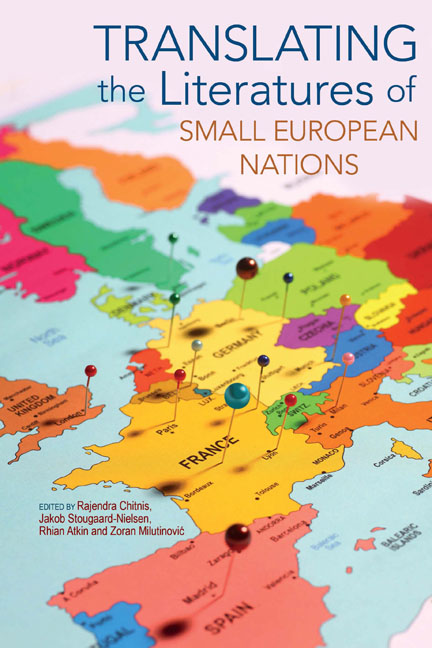Book contents
- Frontmatter
- Contents
- Acknowledgements
- Introduction
- 1 The Global Presentation of Small National Literatures: South Slavs in Literary History and Theory
- 2 Translators as Ambassadors and Gatekeepers: The Case of South Slav Literature
- 3 Supply-driven Translation: Compensating for Lack of Demand
- 4 Literature as Cultural Diplomacy: Czech Literature in Great Britain, 1918–38
- 5 Exporting the Canon: The Mixed Experience of the Dutch Bibliotheca Neerlandica
- 6 Creative Autonomy and Institutional Support in Contemporary Slovene Literature
- 7 Strategies for Success? Evaluating the Rise of Catalan Literature
- 8 Gender, Genre and Nation: Nineteenth-century Swedish Women Writers on Export
- 9 Translating as Re-telling: On the English Proliferation of C.P. Cavafy
- 10 Criminal Peripheries: The Globalization of Scandinavian Crime Fiction and Its Agents
- 11 Literary Translation and Digital Culture: The Transmedial Breakthrough of Poland's The Witcher
- 12 Towards a Multilingual Poetics: Self-translation, Translingualism and Maltese Literature
- 13 Does Size Matter? Questioning Methods for the Study of ‘Small’
- Coda: When Small is Big and Big is Small
- Index
4 - Literature as Cultural Diplomacy: Czech Literature in Great Britain, 1918–38
- Frontmatter
- Contents
- Acknowledgements
- Introduction
- 1 The Global Presentation of Small National Literatures: South Slavs in Literary History and Theory
- 2 Translators as Ambassadors and Gatekeepers: The Case of South Slav Literature
- 3 Supply-driven Translation: Compensating for Lack of Demand
- 4 Literature as Cultural Diplomacy: Czech Literature in Great Britain, 1918–38
- 5 Exporting the Canon: The Mixed Experience of the Dutch Bibliotheca Neerlandica
- 6 Creative Autonomy and Institutional Support in Contemporary Slovene Literature
- 7 Strategies for Success? Evaluating the Rise of Catalan Literature
- 8 Gender, Genre and Nation: Nineteenth-century Swedish Women Writers on Export
- 9 Translating as Re-telling: On the English Proliferation of C.P. Cavafy
- 10 Criminal Peripheries: The Globalization of Scandinavian Crime Fiction and Its Agents
- 11 Literary Translation and Digital Culture: The Transmedial Breakthrough of Poland's The Witcher
- 12 Towards a Multilingual Poetics: Self-translation, Translingualism and Maltese Literature
- 13 Does Size Matter? Questioning Methods for the Study of ‘Small’
- Coda: When Small is Big and Big is Small
- Index
Summary
State support for the translation and international promotion of smaller European literatures forms a refrain of this volume. This generally modest support constitutes part of cultural diplomacy, in its vaguest definition as ‘any undertaking to promote the culture of a country by people who identify themselves with that country’ (Gienow-Hecht and Donfried, 2010, 10). Studies of cultural diplomacy tend to focus on the post-1945 period, particularly the Cold War, and major powers like the United States, the USSR and China, but as Ondřej Vimr notes in the preceding chapter, the origins of this formal state involvement in literary circulation can be traced back to the post-1918 period, when it was arguably the less familiar, militarily and economically weaker European states, created or restored after 1918, that pioneered modern cultural-diplomatic practices as they competed to secure the favour of France, the UK and the USA. Noting the shift to state-led cultural diplomacy after 1918, Jessica Gienow-Hecht and Mark Donfried (2010, 18) write:
Prior to World War I, cultural diplomacy remained an informal effort. […] Most politicians agreed that the presentation of culture abroad should remain confined to individual interest groups and entrepreneurs, and most administrators in the foreign offices in Paris, London, and Berlin were convinced that the active dissemination of culture was important, but none of their business. Their job consisted in monitoring and funding whatever musical production, exhibition, or show they felt might improve their nation's image in the world.
In the post-1918 successor states, however, this distinction between the vaguer, disinterested promotion of one's nation through its culture and the politicized promotion of a specific idea of the nation became obscured because the ‘individual interest groups and entrepreneurs’ – patriotic nobility and intellectuals – who had been informally promoting the national culture abroad before the emergence of the new states were often prominent in the new leadership or civil and diplomatic services. When cultural diplomacy becomes more narrowly understood as ‘a policy designed to encourage public opinion to influence a foreign government and its attitudes towards the sender country’ (Gienow-Hecht, Donfried, 2010, 14), the state may discriminate or be accused of discriminating against writers who do not share its politics or its conception of the country that it wishes to propagate.
- Type
- Chapter
- Information
- Translating the Literatures of Small European Nations , pp. 69 - 90Publisher: Liverpool University PressPrint publication year: 2019

